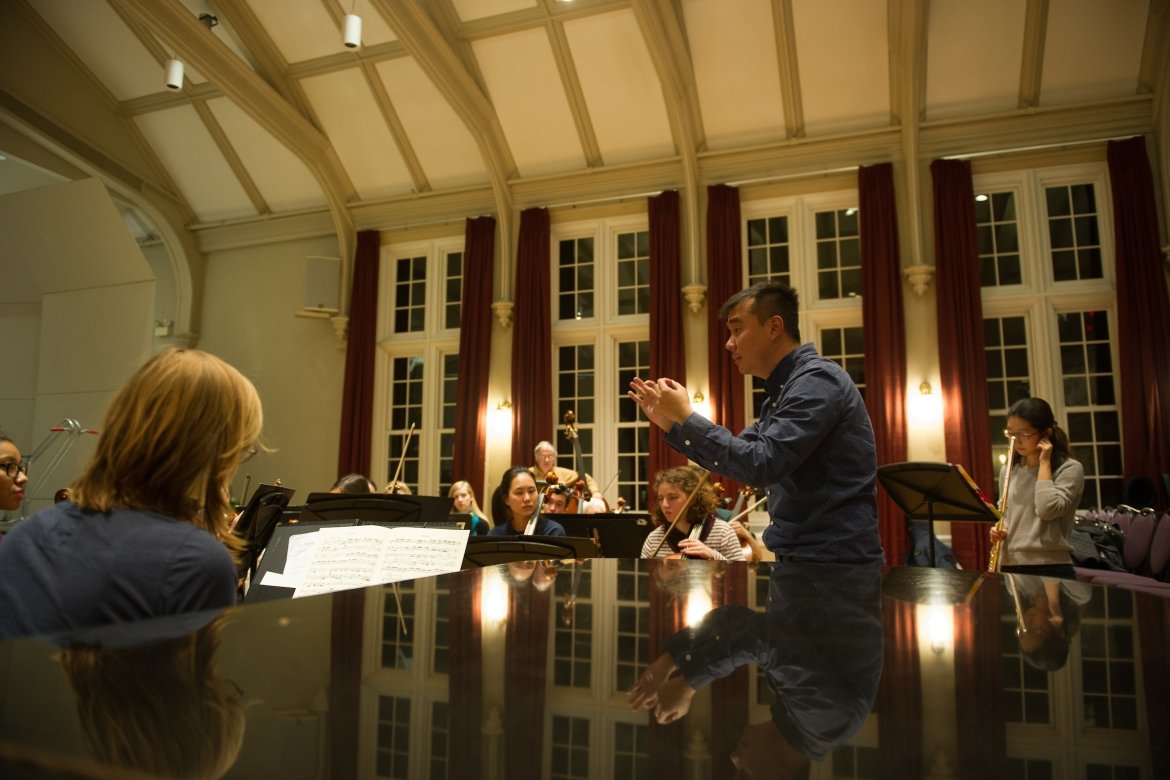Local orchestra focuses on women composers

Members of the Mount Holyoke faculty are playing a key role in the Pioneer Valley Symphony’s new look at women composers.
A challenge for symphony orchestras is how to expose audiences who are comfortable with the standard set of canonical composers to new music and to music by underrepresented and unknown artists.
For Tianhui Ng, associate professor of music at Mount Holyoke College and music director of the Pioneer Valley Symphony, programs of audience education and outreach by the Berlin Philharmonic and the London Symphony Orchestra inspired him with the idea of doing the same thing in western Massachusetts.
“While the leading orchestras of the United States are doing some of this work, in general their work does not reach far beyond their immediate municipalities. This is where I see the role of community orchestras as crucial,” Tian said. “We can and should organize talks and presentations that address the curiosity of the community and enable them to move beyond the standard canon.”
This impulse prompted him to create Pioneer Valley Symphony’s new Discovery Series, a speaker and discussion series that he debuted this fall with an examination of the underrepresentation of women composers in classical music. Launched in mid-October, the six-talk series of the fall program, Hidden Figures: Women Composers Through the Ages, is set to conclude on December 20.
Mount Holyoke is performing a key part in putting the fall series together. Tian, who also directs the Mount Holyoke Symphony Orchestra, conceptualized and created the online presentations. He is also introducing the talks by scholars and experts who are examining women’s roles throughout various historical eras of classical music, spanning from the Renaissance to the present.
One of those scholars is Adeline Mueller, assistant professor of music at Mount Holyoke. She is leading two programs in December on women composers in the classical and romantic periods.
The series launched Saturday, October 17, with a presentation entitled “100 Years of the 19th Amendment” by Andrea Moore, a Smith College musicologist specializing in new classical music and concert culture since 1989.
Focusing on women in 20th- and 21th-century music in their capacities both as patrons and composers, Moore noted that women and nonbinary composers are exerting increased impact on classical music. For example, five of the last 10 Pulitzer Prizes for Music have gone to women. She also pointed to the New York Philharmonic’s Project 19, which has commissioned works by 19 women composers to mark the 100th anniversary this year of one of the key milestones for American women: securing the right to vote.
“One advantage women have now is that they are much more likely to have women as their teachers so women who want to write music have a couple of generations of models,” Moore said. “But that does not mean they do not face difficulties.”
She noted that Western classical music is often dependent on one-on-one relationships with mentors, which has too often resulted in abuse, harassment and even some new composers being driven from the field.
“Still, they are more empowered to create new opportunities for themselves and others, and perhaps more likely to find support for their work than in the past,” she said.
In addition to Moore, the presenters in the Hidden Figures series are Anna Marsh, a baroque wind specialist, who discussed the Renaissance; scholar Liane Curtis, who will discuss 20th century women composers; and organist and harpsichordist Paula Maust, who will focus on the baroque.
“Although the number of recognized women composers expands greatly in the 20th and 21st centuries, there are still a number of notable women composers in the classical and romantic eras,” Mueller said of her December presentations.
“A combination of luck, talent, family or spousal support and other privileges and affordances allowed these women to acquire the training, resources and above all time to pursue their art,” she said. “I look forward to sharing recent discoveries about familiar names like Clara Schumann and Fanny Mendelssohn-Hensel, while also highlighting lesser known composers like Julie Candeille, a composer of comedies during the French Revolution, and Maria Theresia von Paradis, a blind composer, keyboardist and contemporary of Mozart’s who had a special composing keyboard invented for her and who founded a music school for girls in Vienna.”
Mueller researches the vocal and theatrical music of Mozart and his contemporaries, with a particular interest in marginalized European composers around 1800. She regularly teaches a First-year Seminar, Women and Music: Sounding Community, and includes underrepresented composers in her music history survey course and in topics-based courses on opera, musical theater and music analysis.
“Closer to home, Boston and the women’s colleges and seminaries of New England such as Mount Holyoke and Smith were also sites of opportunity for women composers and conductors,” Mueller said. “We will explore the music of some of these composers, such as the temperance and abolition songwriter Susan Parkhurst, born just down the road from us in Leicester. I will also share the stories and art songs of the Parisian Pauline Viardot and the Chilean Isidora Zegers, as well as the prison songs of Hawaii’s last monarch, Queen Liliuokalani.”
The boundary-crossing-and-expanding approach highlighted by the Pioneer Valley Symphony’s Discovery Series is also enhancing the Mount Holyoke curriculum. Tian is bringing musical innovators from contemporary music to his students and the Mount Holyoke community through an ongoing program of online presentations known as Sonic Vanguard. Speakers for the series formed the basis of Tian’s class of the same name this semester.
Recorded presentations from this semester will go online in the weeks ahead. That series will resume in the spring.